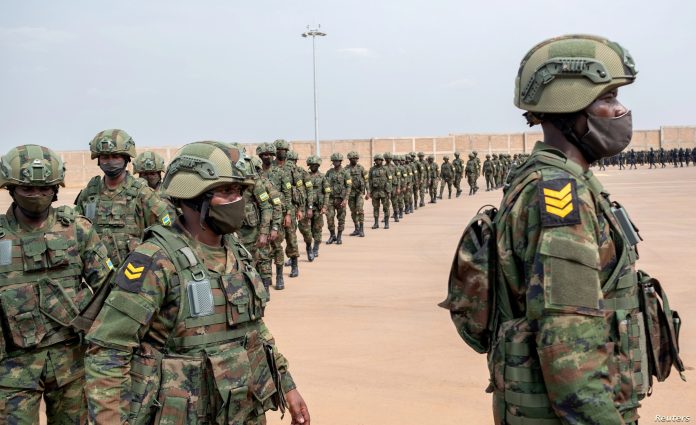Rwanda last month sent more troops to join the 2,500 soldiers currently fighting the insurgency in Cabo Delgado, northern Mozambique, at a time when armed groups linked to the Islamic State are increasing their activity.
The new contingent will occupy spaces left by the departure of the Southern African Development Community Mission in Mozambique (SAMIM), including in the district of Macomia that was recently attacked by the insurgents, Mozambican President Filipe Nyusi said on Friday, speaking in Kigali, where he met with his Rwandan counterpart Paul Kagame.
Nyusi did not say the number of troops comprising the military contingent, but a source told Atlas News that “hundreds” of troops, including police and military, were seen landing at Nacala International Airport in Nampula province.
The continued commitment to the military option, according to Nyusi, has to do with the lack of a reliable leader that can exert control over the insurgency and bring the group cohesively to negotiations with the Mozambican government. Some observers, however, question the statement, saying that with political will, means can be found for talks with the leaders of the armed groups.
Rwandan forces have been in Mozambique since July 2021 and their operations have stabilized many areas of Cabo Delgado, including Palma district, where billion-dollar gas projects are to be installed. French oil giant TotalEnergies has suspended its work, but guarantees that if security conditions continue to stabilize, work will soon resume.
In addition to the Rwandan forces, South African and Tanzanian troops remain in Cabo Delgado in the context of bilateral cooperation. The European Union (EU) is taking part in the fight by training Mozambican troops.
Recently, the Council of the EU extended the mandate of its training mission in Mozambique (the European Training Mission in Mozambique, or EEAS) until June 2026, with a budget allocation of over €14 million euros (about $15 million dollars) for the period. The Council has also approved the mission’s transition from a training model to an assistance model, combining advising, mentoring and specialized training in support of Mozambique’s QRF units, according to the EU statement. As a consequence of this change, made “to adapt the strategic objectives of the mission to new circumstances,” the mission will be renamed EU Military Assistance Mission Mozambique (EUMAM Mozambique), as of September 1, 2024.
Mozambique thanked the EU for the decision, but once again asked for lethal aid, saying that non-lethal material is not enough for the fight against insurgency.

